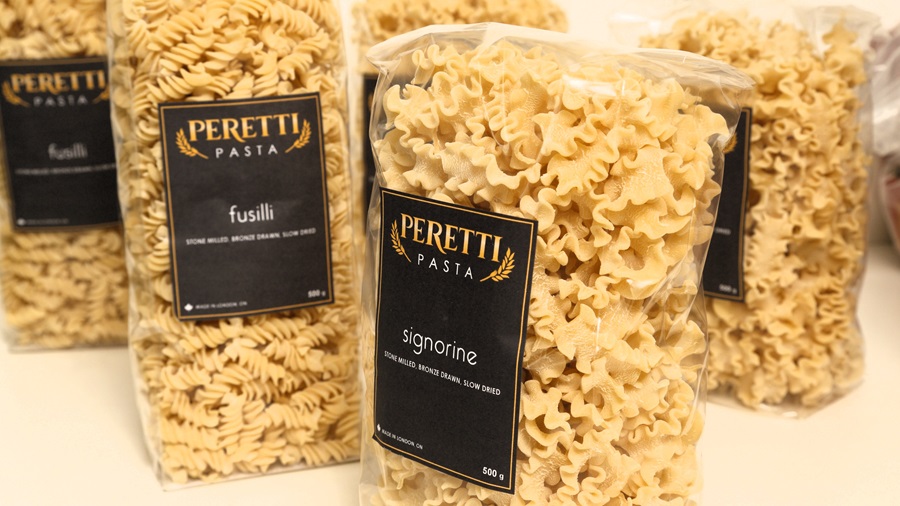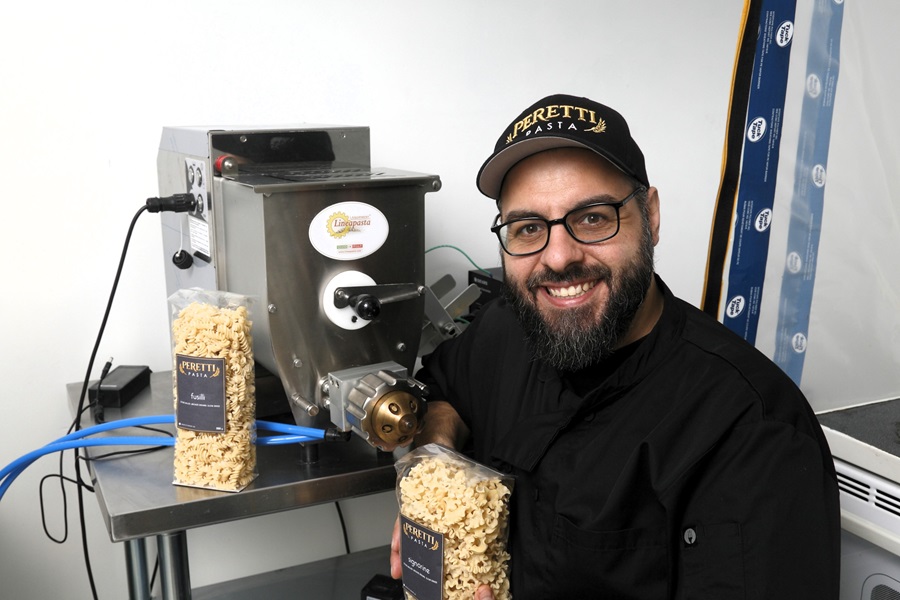A return to basics
No need to smuggle back noodles from your next Roman holiday. An artisanal pasta startup offers a new take on traditional dried pasta
Photo: Peretti Pasta founder Alex Dreja
BACK AT THE beginning of 2023, pasta made a bit of a splash in London when Italian pasta giant Andriani SpA announced it had purchased a parcel of land in Innovation Park and would open its first North American production facility here in 2024.
Click here to view this article in magazine format
But as substantial as that announcement was, it wasn’t the only pasta maker stirring things up in town.
During the pandemic, when people were locked down in their homes, many were doing two things: thinking about the future, and cooking with the family. And for some, this combination was the push into entrepreneurship they needed.
Story Continues Below
At least, that’s roughly how it worked out for Alex Dreja, who founded Peretti Pasta in the spring of 2022. When the pandemic hit in 2020, he was working for a bank, but suddenly found himself at home, spending a lot more time cooking with his wife and kids. Gradually, his thoughts turned to the future.
“The thought was in the back of my mind — what am I going to do for the next 25 years? Am I going to keep my job and the stability it offers or try to do something a little bit different and take on some new challenges? That’s where we landed,” he says.
“We decided that if we were going to start a business, then we were going to launch into it and go full-board,” he adds. “So, I quit my job at the bank and started making pasta full-time.”
“What am I going to do for the next 25 years? Am I going to keep my job and the stability it offers or try to do something a little bit different and take on some new challenges?” —Alex Dreja
The first iteration of Peretti Pasta was a frozen ravioli, filled with meats and a variety of sauces. But Dreja says he struggled to produce the exact desired results, so he made the switch to dried pasta. “We realized it was a fantastic product. People were really enjoying it,” he says. “And it didn’t have any of the logistical issues that were involved in the frozen ravioli, so we pivoted and started focusing directly on the dried pasta.”
What makes Peretti Pasta different? Dreja says it’s about sticking to a few fundamentals and doing things in “the ancient way that people used to do it, years and years ago.”
Step one is to use the right ingredients. Peretti uses a durum semolina flour, stone-milled and imported from Italy, which he says tastes better and produces a lighter pasta that is easier to digest for people with gluten intolerance or who find that pasta can be bloating.
Step two is to use the right equipment. In Peretti’s case, this means using an extruder equipped with bronze dies to produce a variety of pasta shapes and sizes with a distinct rough texture.

“The bronze die doesn’t have a smooth finish to it like industrial Teflon-coated dies, so it pulls on the pasta a little bit as it’s coming through,” Dreja explains. “It makes the extrusion slower, but the benefit is that the pasta holds onto the sauce a lot better; the sauce doesn’t slide off the pasta because it’s got something to hold onto in the texture on the outside of the pasta itself.”
The third step is patience. Dreja doesn’t employ the same high-heat drying process that industrially produced pastas use, instead using a slower, low-temperature drying process.
“When our pasta is dried, it takes about a day and a half,” Dreja says. “That results in a much creamier pasta — it almost melts in your mouth. A lot of the natural enzymes are retained in the pasta because it stays at a low temperature and is a lower impact process.” (It’s also the reason why slow-dried pasta is lighter in colour than quick-dried industrial pastas.)
Put it all together and Dreja says the result is a premium dried pasta aimed at home cooks looking for high-quality ingredients to use in their dishes.
Story Continues Below
With the product dialed in, Dreja says the next phase of the business is to start expanding their distribution network. Since launching, the strategy has been to wholesale to regional specialty food shops. “The smaller niche retailers are what we’re in right now, and we like that market to promote our brand so we’re looking at building that geographically,” he says.
Dreja would also like to see Peretti Pasta stocked in the specialty sections of larger grocery stores. “That’ll let us get the name out there — and hopefully grow a little bit more geographically as well.”
If they can achieve that, Dreja believes it will put them on the road to becoming something bigger — a family-run business synonymous with great, locally-produced pasta.
“Really, I hope that we become a household name,” he says. “The great pasta that’s made in Canada from Italian roots. That’s the big thing.” ![]() Kieran Delamont
Kieran Delamont

